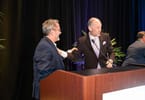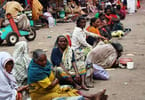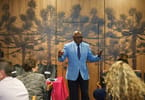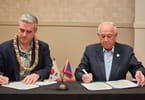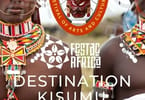eTN caught up with Walter Mzembi, Minister of Hospitality and Tourism for Zimbabwe, at the recently concluded United Nations World Tourism Organization General Assembly, which was held in Astana, Kazakhstan. Minister Mzembi talks about the current situation in Zimbabwe in terms of the beleaguered country’s travel and tourism industry.
eTN: How is the situation in Zimbabwe in regards to tourism?
Walter Mzembi: 2008, because it was the last year, on the back of elections, the tourism GDP contribution fell down to 6.5 percent, and this is our starting point. But going forward we are saying by 2012, tourism should be contributing 15 percent to the gross domestic product. It is the only sector that has been identified as a growing sector even when the economy was gliding through recession, it is still growing. Even when we are going through our difficult time, that’s when we recorded the highest statistical arrivals of 2.5 million. We are projecting 3 million to 3.5 million in the coming year on the back of World Cup 2010 where we expect a lot of traffic. And one in every 12 of our people in Zimbabwe are employed in tourism, and it’s a community-based driven industry A lot of the sites the tourists visit in Zimbabwe are located within the region of Vctoria Falls, and in areas relevant to wildlife. Africa is the world’s largest area for wildlife. But most specifically, Zimbabwe itself is the oven for wildlife. We view the positioning and repositioning of Zimbabwe as something that we are holding in trust for the entire world.
eTN: How is the infrastructure in tourism after your country had difficulties?
Mzembi: It is still very much intact; the infrastructure is still very much intact. What it needs is a bit of capital to spruce it up, to retool. The product is tired. It has not been renewed for the last 10 years. But the infrastructure, the mainframe, is intact. What we need is working capital to kick it off once again.
eTN: Yesterday, I don’t know if you were here, but you may have heard the presentation from Geoffrey Lipman in regards to the Roadmap for Recovery. How could this apply for Zimbabwe and how could Zimbabwe benefit?
Mzembi: The recovery that Professor Lipman refers to [does] not really apply for us at this time. We are already on an all-time low. We are in the position where we are already prescribing our own solutions because of our own special circumstances. However, what we have done with Professor Lipman and team is to invite them to Zimbabwe to come and tell a specific kind of program for Zimbabwe, which they have done, and we are following a specific roadmap as doctored and prescribed by the UNWTO. We were quite happy for the intervention, but the global description on the Roadmap to Recovery does not quite fit our country, because we [are] already in a trough anyway, on the back of economic sanctions and on the back of our own individual isolation as a result of our fallout with individual communities. So they have doctored and prescribed a specific program for Zimbabwe, which was consummated a few weeks ago, and we are following that.
eTN: Very good. I know it is a beautiful country. I visited many years ago in the 80s, and I was very impressed, I have to say.
Mzembi: Thank you. We happen to be in the fortunate position where we have one of the global icons in tourism – the Victoria Falls – one of the only two of the natural wonders of the world together with the Hanging Gardens of Babylon, but one of the seven wonders of the world. That puts us in a very unique position in terms of how we are marketing ourselves. And it is to us a travesty of justice if any individual is denied the opportunity to come and view the Victoria Falls on the back of politics. We happen to host Victoria Falls, but it should be everyone’s tourism pilgrimage to visit the Victoria Falls.
eTN: I know when I went to Victoria Falls, it was really just developed on the Zimbabwe side. I actually went on a bicycle to Livingston in Zambia, and there was nothing. And now Livingston, of course, is developed, and Zambia has invested heavily in tourism.
Mzembi: They took advantage of our 10 years of isolation, and fueled it again. But we are not unhappy about that, we are very happy – it is complimentary. What we see is they are the back side, we are the front side, and together we make the whole sum unit.
eTN: That’s a good statement. Please keep us informed if there is any development. We are very interested in Zimbabwe, and this is definitely something the world should know about.I know you have an excellent product.
Mzembi: We have an excellent product. I was in Washington recently. I met Madame Clinton and John Kerry, a number of your congressional staff, and I said to them, please don’t deny yourself the opportunity to revisit Victoria Falls once again. They have nostalgic memories of Zimbabwe, about their own engagement even with their own president, and they want to come back. And I said, no, please, I will facilitate and make sure it [happens]. They have a chance to see our global community from Victoria Falls. Later on we met Gordon Brown, the Prime Minister of Great Britain, and I passed the same message – don’t deny your citizens the opportunity to see, and I pointed out that it (Victoria Falls) is even named after your own very Queen – Queen Victoria.
eTN: Queen Victoria Hotel – I stayed there.
Mzembi: Absolutely. So there is a lot of good will coming from the international community, and we appreciate the assistance.
eTN: That’s good. I think with the Obama administration in North America, it is positive, and I think there is going to be a lot of opportunities.
Mzembi: We hope so. We are looking forward to a more engaging relationship.
eTN: Actually my other job has nothing to do with eTurboNews. I work with the US Department of Commerce. I am head of the Tourism Committee for the new initiative we have to eventually start a Department of Tourism, because the US is not a member of the UNWTO.
Mzembi: My message yesterday when I listened to the intervention on the back of the debate on the Roadmap for Recovery was that politics should never, ever, ever interfere with tourism. If two administrations fall out because of other issues, that should never affect tourism – that bridge is provided for by tourism. Now, having raised this issue, I am saying to you and I am appealing to you through this interview that the American administration must mitigate the effects of this data, of [these] travel warnings, which was imposed on Zimbabwe at the height of our fallout. We must begin the process of reworking that so that we allow our people to engage in a more peaceful and engaging way. I must repeat, politics should never come in the face of tourism. We must depoliticize the sector so that we allow our people to then conduct and to influence each other and live in a more international way.
eTN: But looking forward, you mentioned the World Soccer event in South Africa. Are you working with South Africa tourism?
Mzembi: We are working with South Africa. We recognize that this event is coming to South Africa in 2010. South Africa will be the platform, Africa will be the theater. The next time that this event may be in Africa it will be 2024, and it will not be in Southern Africa, it will be North Africa. So we are seeing this as an international event that should be taken much more advantage of. We are ready to participate in the provision of accommodation, in the provision of amenities, and making sure that those who want to have the fruits, the tourism products, have an opportunity while they are in the region, to view also Zimbabwe as a taste of Africa when they are in the region at that time.
WHAT TO TAKE AWAY FROM THIS ARTICLE:
- We were quite happy for the intervention, but the global description on the Roadmap to Recovery does not quite fit our country, because we [are] already in a trough anyway, on the back of economic sanctions and on the back of our own individual isolation as a result of our fallout with individual communities.
- And one in every 12 of our people in Zimbabwe are employed in tourism, and it's a community-based driven industry A lot of the sites the tourists visit in Zimbabwe are located within the region of Vctoria Falls, and in areas relevant to wildlife.
- However, what we have done with Professor Lipman and team is to invite them to Zimbabwe to come and tell a specific kind of program for Zimbabwe, which they have done, and we are following a specific roadmap as doctored and prescribed by the UNWTO.





